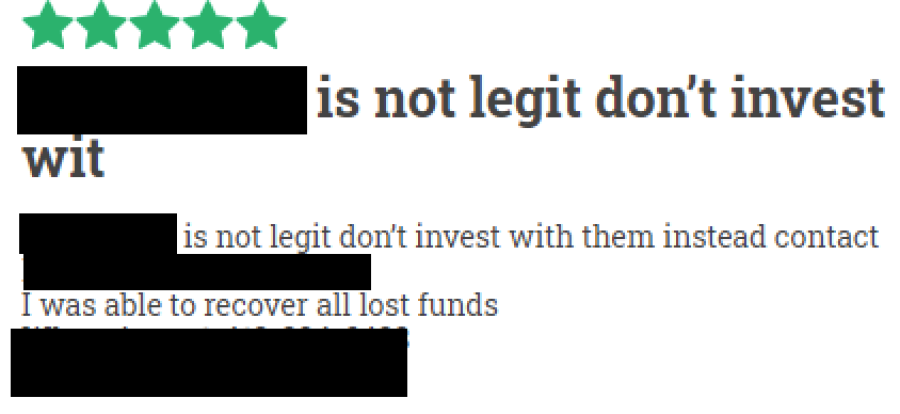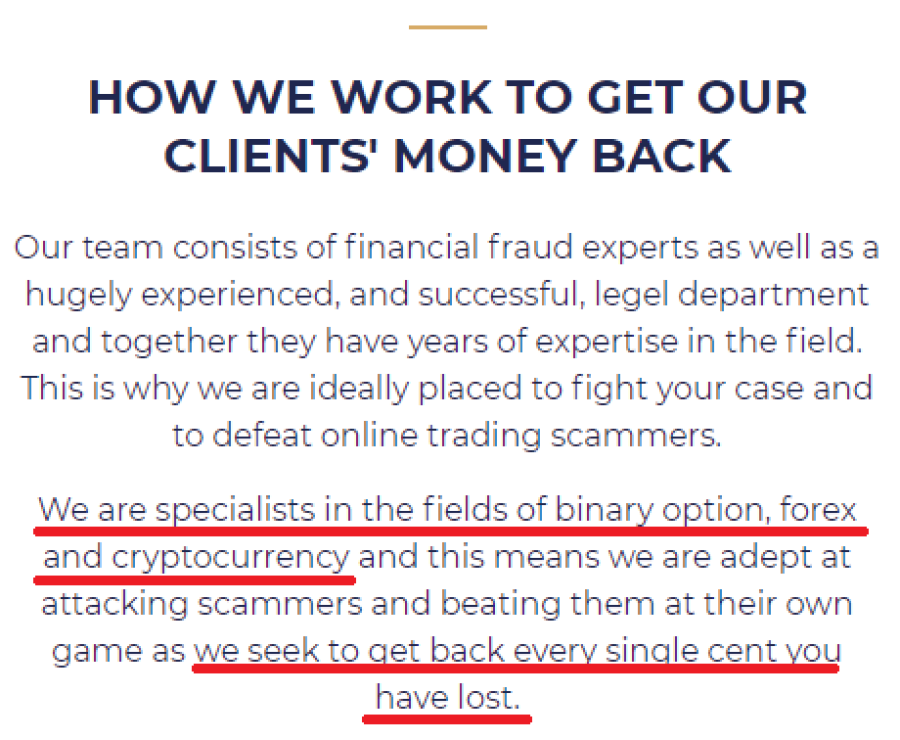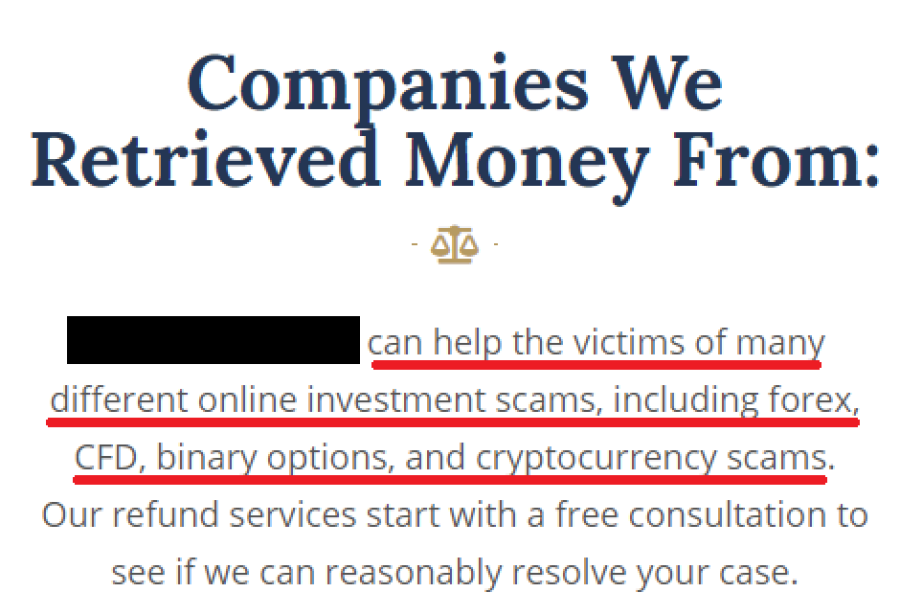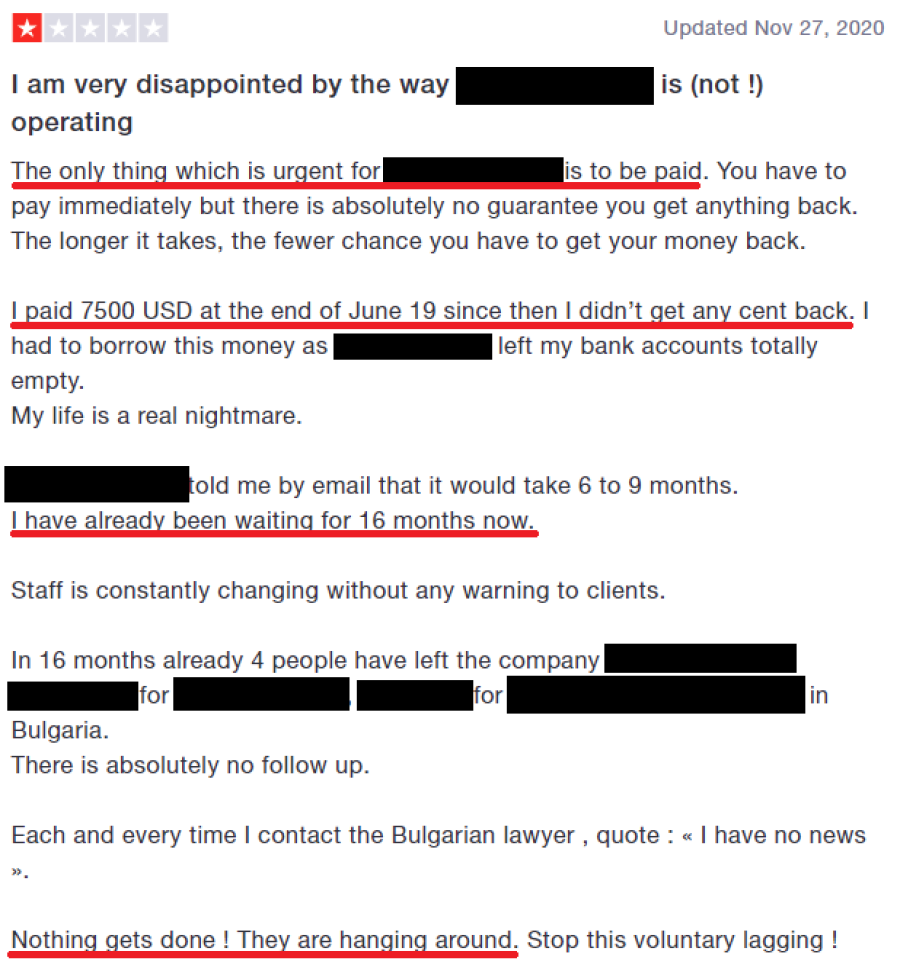Can Cryptocurrency Be Recovered From Scammers?

Author: James Greening
Cryptocurrency transactions are becoming more and more common by the day, even though few are aware of the dangers associated with them. By the time they do, it is usually too late.
This lack of knowledge has proven to be a boon for scammers, who exploit certain drawbacks of blockchain technology to defraud consumers. Scammers have now moved on from receiving payments through methods such as Gift card and Western Union to cryptocurrency, as it provides them increased anonymity and safety.
Investment scams are the most common kind of scam involving cryptocurrency. At Scamadviser, we come across numerous fake investment websites daily. These sites promise absurdly high returns such as 1% per day indefinitely and claim to trade cryptocurrencies, forex, binary options and more.
The victims they target have poor knowledge of investing and are easily swayed into parting with their money, only to later realize that it was all a scam. As the scammers demand to be paid using cryptocurrency, usually Bitcoin, we regularly get requests from victims who need help getting their stolen crypto-funds back.
Can Cryptocurrency Transactions be Reversed?
Simply put, no.
Without going into technical details, the nature of blockchain technology is such that transactions once processed cannot be reversed. There is no ‘chargeback’ facility similar to credit cards as there is no central authority who can control the flow of funds. There is no bank acting as a middleman between you and the merchant. In essence, blockchain transactions are more akin to a cash transaction than a bank transfer. Some crypto wallets do have a built-in ‘Refund’ option, but the refund has to be initiated by the merchant himself and cannot be forced by a third-party.
To understand this better, let’s take the example of credit cards. If you pay a merchant using a credit card, the bank makes a digital payment to the merchant on your behalf and this amount is later covered by you when you pay the credit card bill. If you apply for a chargeback, the bank simply reverses the payment it made to the merchant and the same is deducted from your credit card bill. This system provides a kind of safety net.
With cryptocurrencies, as there is no middleman, there is no safety net either. You cannot complain to ‘customer service’ if you get scammed, as there is no singular entity in charge of the blockchain.
Tracking Crypto Transactions to Reveal the Scammer’s Identity
Each cryptocurrency transaction has a unique ‘fingerprint’ which makes it possible to track the flow of funds from one crypto wallet to another. However, the transactions are anonymous and cannot be directly tied to any particular individual.
In theory, it is possible to find out who the person behind these transactions is. In practice, trying to identify the individual who is using the wallet is a long and tricky process that needs the involvement of multiple parties.
After establishing the trail of the movement of funds, the investigation agency needs to contact the exchange with a request to reveal the identity of the person who owns the wallet. It is mandatory in most countries to verify users using a Know Your Customer (KYC) process to prevent money laundering. However, many of these companies are set up in countries that do not require KYC verification.
The scammer could also transfer the funds offline into what is known as a ‘cold wallet’, bringing the trail to a dead end.
Next, assuming that the funds have not been transferred into a cold wallet and that the wallet or exchange performs KYC verification, they may most probably refuse to reveal the information unless there is a formal request from law enforcement authorities. This can be a complicated process as cryptocurrency scammers operate internationally, meaning that law enforcement authorities from multiple countries need to coordinate.
It is also common for scammers to use money mules to launder their money. Therefore, the person under whom the wallet has been registered may not be the scammer at all.
After all this effort, even if the scammer is identified, the victim has to be lucky enough that the scammer still has the funds to pay them back.
What we can infer from this that even though crypto transactions can theoretically be tracked to identify the scammer, it is almost impossible to do so in a realistic scenario. The amounts lost are generally not big enough for law enforcement to get involved and the case can drag on indefinitely if it is international.
Cryptocurrency Recovery Agencies
Despite it being quite clear that cryptocurrency transactions are irreversible, there are plenty of companies confidently boasting that they can help victims of scams recover their cryptocurrency. All of them follow the same patterns. Firstly, they heavily promote their services through mediums such as search engines:


Spam advertisements on sites such as YouTube and Instagram.


Even on Scamadviser, we remove about 200 to 300 fake reviews every month from people who say their funds have been recovered by a recovery firm. These reviews should never be trusted.

They also send out paid press releases that could be confused as being real news articles.

The websites always contain testimonials from elated clients who thought they would never get their money back, but successfully recovered their stolen funds thanks to the recovery agency.

They all appear highly-confident and specifically mention being able to recover cryptocurrency.


So, do they have a secret that the rest of the crypto world is unaware of? Well, most of these firms we have investigated are complete scams while others provide services of dubious effectiveness.
They all provide ‘free consultations’, apparently to gauge whether there is a chance of the victim getting their money back. Curiously, they never seem to turn a case down. The real purpose of the consultation is to understand the client’s level of desperation.
As many of their victims lose their life savings, they are desperate for any kind of hope for getting their money back. Unsurprisingly, they will go along with any demands made by the recovery agency as long as they keep offering hope of reclaiming funds. These firms always ask for advance fees and never work on a performance basis ie. deducting their fees from the recovered amount, even though they may claim so initially.
While some of them claim to be ‘investigation agencies’ rather than ‘chargeback agencies’, the statements made in their advertisements and websites about high success rates do not support what they say.
We have come across two types of recovery agencies when it comes to cryptocurrency chargebacks: Scams and Borderline Scams
Scam Recovery Agencies
Scammers maintain so-called ‘donkey lists’ or ‘sucker lists’ of victims who they will eventually target again with yet another scam. In the case of investment scammers, they approach the victims after a short period by pretending to be recovery agents.
These kinds of firms are nothing but Advance Fee scams, wherein they take your money and disappear. A common trick is to ask for the victim’s e-wallet credentials, including the private key, to gain access. They then ask the victim to deposit a certain amount into the e-wallet to ‘convert the recovered non-spendable Bitcoin into spendable Bitcoin’.
Even though this is nonsense, the victims don’t know this and end up depositing money in the wallet that the scammer has access to. Once this is done, it’s simply a matter of moving the funds into the scammer’s own crypto wallet and disappearing.
Borderline Scam Recovery Agencies
These are recovery agencies that operate relatively professionally and do provide real services when it comes to non-crypto recovery. However, all they do is share templatized emails that the victim themself has to send to the bank or card company. These are things people can do themselves at no cost. Still, as there is some sort of service being provided, it cannot be called a complete scam.
However, things get much shadier when it comes to cryptocurrency recovery by these firms. We have checked reviews for these sites and found that while they might have overall positive reviews, the reviews involving cases of cryptocurrencies are not nearly as positive.

They provide false hope of recovering crypto funds despite knowing that the chances are slim, just so that they can extract fees from the client in the form of a retainer.
In these cases too, they simply provide emails based on templates that the victim has to send to law enforcement authorities and scam brokers. While some scam brokers may provide refunds based on threats of legal action, most do not. Ultimately, the clients end up paying retainer fee after retainer fee as the case drags on, eventually going into deeper loss.

Conclusion
Currently, there are innovative ways being devised to help scam victims reclaim their money. Unfortunately, the technology that could enable this is still being worked on and is not yet publicly available. While there is hope that crypto can be recovered in the future, it will probably never be free or as easy as recovering fiat currency from scammers.
Bottom line: Never pay strangers using cryptocurrency as there is no hope of recovery if you get scammed.
Know More
Follow our social media channels for news about the latest scams and tips to stay safe online. We also invite you to join the growing community of scam fighters on our Facebook Group.
- Scamadviser Facebook Page
- Global Scam Fighters - Facebook Group
- Scamadviser Twitter Profile
- YouTube Channel
This article has been written by a scam fighter volunteer. If you believe the article above contains inaccuracies or is missing relevant information, please contact Scamadviser.com using this form.
Report a Scam!

Have you fallen for a hoax, bought a fake product? Report the site and warn others!
Scam Categories
Help & Info
Popular Stories
As the influence of the internet rises, so does the prevalence of online scams. There are fraudsters making all kinds of claims to trap victims online - from fake investment opportunities to online stores - and the internet allows them to operate from any part of the world with anonymity. The ability to spot online scams is an important skill to have as the virtual world is increasingly becoming a part of every facet of our lives. The below tips will help you identify the signs which can indicate that a website could be a scam. Common Sense: Too Good To Be True When looking for goods online, a great deal can be very enticing. A Gucci bag or a new iPhone for half the price? Who wouldn’t want to grab such a deal? Scammers know this too and try to take advantage of the fact. If an online deal looks too good to be true, think twice and double-check things. The easiest way to do this is to simply check out the same product at competing websites (that you trust). If the difference in prices is huge, it might be better to double-check the rest of the website. Check Out the Social Media Links Social media is a core part of ecommerce businesses these days and consumers often expect online shops to have a social media presence. Scammers know this and often insert logos of social media sites on their websites. Scratching beneath the surface often reveals this fu
So the worst has come to pass - you realise you parted with your money too fast, and the site you used was a scam - what now? Well first of all, don’t despair!! If you think you have been scammed, the first port of call when having an issue is to simply ask for a refund. This is the first and easiest step to determine whether you are dealing with a genuine company or scammers. Sadly, getting your money back from a scammer is not as simple as just asking. If you are indeed dealing with scammers, the procedure (and chance) of getting your money back varies depending on the payment method you used. PayPal Debit card/Credit card Bank transfer Wire transfer Google Pay Bitcoin PayPal If you used PayPal, you have a strong chance of getting your money back if you were scammed. On their website, you can file a dispute within 180 calendar days of your purchase. Conditions to file a dispute: The simplest situation is that you ordered from an online store and it has not arrived. In this case this is what PayPal states: "If your order never shows up and the seller can't provide proof of shipment or delivery, you'll get a full refund. It's that simple." The scammer has sent you a completely different item. For example, you ordered a PlayStation 4, but instead received only a Playstation controller. The condition of the item was misrepresented on the product page. This could be the